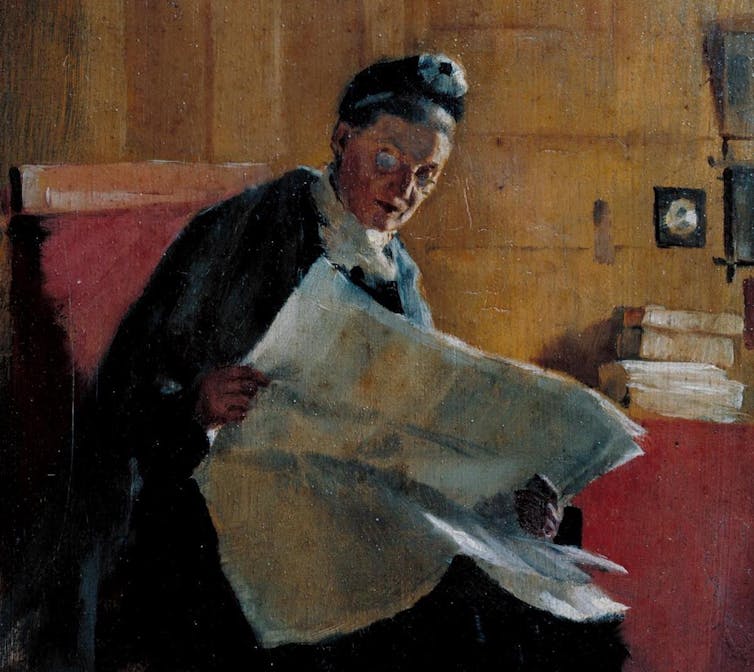As the provincial press has declined in Britain, so too has local arts and cultural criticism. In the 19th and early 20th century, regional newspapers regularly published reviews of theatre productions and a wide variety of books including history, science, travel writing, poetry and fiction.
Starting in the late 19th century and coming to a head in the Edwardian period (1901-1914), regional newspapers even experimented with a different style of reviewing, which was shorter, chattier and more personal – a shift from the more formal style of the Victorian era.
Historians have traced the sad decline in the fortunes of the local and regional newspaper press with interest. In the 19th century, it was impossible to get a London paper to distant towns or cities by breakfast, because the train system didn’t yet run quickly enough. This gave local newspapers a clear advantage in distribution.
Transportation began to change at the turn of the 20th century, however, and by the 1950s, the national dailies dominated the British market. As a result, local and regional papers had to consolidate titles. The computerisation of the newspaper workforce meant further lost jobs in the 1980s and 1990s. And today, they struggle to compete with social media for classified ad revenue.
Access to these local and regional papers can be gained through inexpensive databases such as the British Newspaper Archive, which is available at many local libraries. A brief perusal of this database shows that many different sorts of papers published book reviews, from major regional titles such as the Glasgow Herald to smaller titles, including the Walsall Advertiser.
These reviews were published before the reviews in esteemed national quarterlies or monthlies and could therefore set the tone. A reader could turn to their local morning paper for ideas of theatre productions to purchase tickets to, or books to borrow from circulating libraries.
Although newspaper syndications existed during this period and reviews of monthly magazines were often repeated verbatim in several local titles, reviews of individual books were overwhelmingly original. This means that someone, probably local to the area, received a copy of the book and was paid to report on the reading experience for a wide variety of readerships.

Since these reviews had no byline, it is difficult to trace who wrote them. Book reviews were also printed on the same page as articles about economics, politics, or sports, which made them seem more like news and less like a rarefied topic divorced from the issues of the day.
The changing review
In the Edwardian period, when the number of readers had risen due to the establishment of public libraries and state-funded primary education, reviews in local and regional newspapers began to change and become more experimental in style.
Due to competition from an ever-growing number of newspapers and magazines, reviews were generally published earlier and became shorter. Various cultural commentators, including Edith Wharton and T.S. Eliot, bemoaned the lowering of the national tone through these shorter reviews.
Edith Wharton, for example, complained that reviewers supplied plot summaries rather than judging the books: “Whether real criticism be of service to literature or not, it is clear that this pseudo-reviewing is harmful, since it places books of very different qualities on the same dead level of mediocrity, by ignoring their true purport and significance.”
Wharton and others attributed this different style of reviewing to the cultivation of a different style of reading, which became known as “middlebrow”. Reviews in provincial papers targeted their remarks about books at the leisure reader, complaining when a title was too long, disliking a book when it seemed too gloomy, or praising an author who seemed to be writing for women.
Such reviewing catered to a new, less reverent form of reading. Although many cultural critics of the day (and today) sneer at middlebrow taste, I view it as a democratisation of the reading experience.
The loss of the local paper was also a loss for local readers, who could no longer rely on receiving reviews from someone in their area. Some newspaper historians argue that modern local papers will have to seek new business models to survive, given that they are no longer able to compete with social media.
Forms of media are always changing. Today anyone can publish a review on sites like Goodreads. The local press must consider many factors as it carves a place for itself in the new media landscape – and perhaps the vibrant arts scene of the past can serve as food for thought.

Looking for something good? Cut through the noise with a carefully curated selection of the latest releases, live events and exhibitions, straight to your inbox every fortnight, on Fridays. Sign up here.
Edwardian local press invented the 'middlebrow' with a lively mix of local news, reviews and fiction - The Conversation
Read More
No comments:
Post a Comment